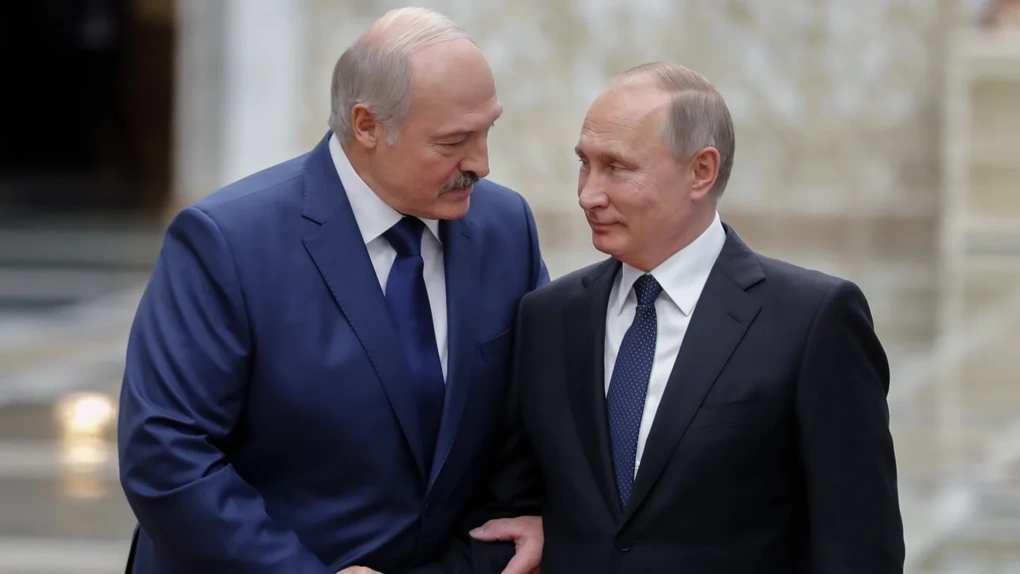(Dan Tri) – While the situation in Southern Russia was very tense due to tycoon Wagner’s rebellion, the President of Belarus continuously contacted the parties to skillfully help defuse the `detonator` in the 89th minute.
Belarus President Lukashenko (left) and Russian President Putin (Photo: AFP).
The `rebellion` of private military force boss Wagner Yevgeny Prigozhin developed very quickly, making the whole world watch closely.
The situation seemed to be about to suffocate when the Governor of Russia’s Lipetsk region confirmed on the afternoon of June 24 local time that Wagner forces had entered this area and were moving towards Moscow.
At a critical moment when Wagner’s army approached Moscow, Belarusian President Alexander Lukashenko became a key figure helping turn the situation around.
After a long period of communication, President Lukashenko and Prigozhin reached an agreement `not to allow bloodshed on Russian soil`.
Some analysts believe that the key to helping President Lukashenko successfully reconcile without bloodshed `is the optimal balanced solution for all parties involved. If bloodshed occurs, all parties will be affected.`
According to BelTA, Russian President Putin informed about the situation in the country during a phone call with his counterpart Lukashenko on June 24.
After President Lukashenko further clarified the situation through his private channels, he had a phone call with Prigozhin with President Putin’s consent.
As for why President Lukashenko?
Afterwards, President Lukashenko spoke on the phone with President Putin and informed him of the status of negotiations with Prigozhin.
So what does Prigozhin really want?
This time was no exception, the conflict between Prigozhin and the Russian Ministry of Defense was only part of the cause of the mutiny crisis.
Wagner has great power but is outside the system, and is a huge potential threat to the existing order in Russia.
Some analysts have long questioned the fate of Prigozhin and the Wagner organization, arguing that he is trying to convert his `military capital` into `political capital`, in order to achieve political status.

Wagner gunmen withdrew from the headquarters of Russia’s Southern Military District in the city of Rostov-on-Don to return to base on the evening of June 24 (Photo: Reuters).
It is in such circumstances that President Putin signed a decree in early March this year to legally regulate and restrict relevant companies participating in the implementation of defense orders and promoting
The Russian Ministry of Defense announced on June 10 that all volunteer groups participating in special military operations must sign a contract with the Ministry of Defense before July 1 to participate in combat.
Based on this logic, observers have predicted that 2023 could be Wagner’s last year.
The armed uprising on June 23 is a typical example of using small things to make big profits, demonstrating pragmatic opportunism to the maximum.
However, Moscow has reached a compromise, the time is considered moderate, without bloodshed.
Therefore, Prigozhin, who had pursued a political career for more than half his life, chose to make a sudden change.
`Wagner’s soldiers had not shed a single drop of blood during the entire operation but now the time for possible bloodshed had come and so the Russians could suffer fratricide.`
Video circulating on social networks shows Prigozhin smiling and sitting in a car leaving the city of Rostov-on-Don on the evening of June 24.

Commander Wagner Yevgeny Prigozhin left the headquarters of the Southern Military District Command for Belarus (Photo: Reuters).
Press Secretary of Russian President Peskov announced that the criminal case against Prigozhin will be withdrawn and he will go to Belarus.
In addition, Wagner members who initially refused to participate in the uprising will be given service contracts with the Russian Ministry of Defense, and Wagner members who participated in the rebellion will not be held accountable for their achievements in the rebellion.
President Putin’s press secretary, Mr. Dmitry Peskov, said that Mr. Putin had phone calls with Belarus President Lukashenko, Uzbekistan President Shavkat Mirziyoyev, Kazakhstan President Kassym-Jomart Tokayev and other leaders.
US Secretary of State Antony Blinken also announced on social media that he spoke with foreign ministers of the G7 group and senior representatives of foreign and security policy of the European Union to discuss the situation.
However, the impact of this incident may continue, such as whether there will be personnel adjustments in the Russian Ministry of Defense and whether the incident will affect the special military operations of the Russian army in Ukraine.
